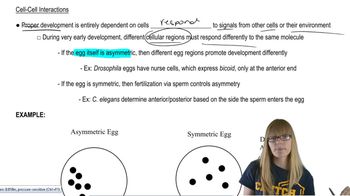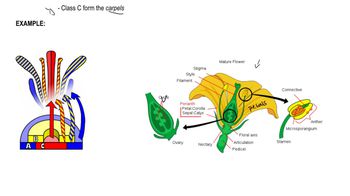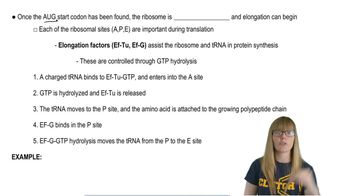What are the four processes of evolution? Briefly describe each process.
Table of contents
- 1. Introduction to Genetics51m
- 2. Mendel's Laws of Inheritance3h 37m
- 3. Extensions to Mendelian Inheritance2h 41m
- 4. Genetic Mapping and Linkage2h 28m
- 5. Genetics of Bacteria and Viruses1h 21m
- 6. Chromosomal Variation1h 48m
- 7. DNA and Chromosome Structure56m
- 8. DNA Replication1h 10m
- 9. Mitosis and Meiosis1h 34m
- 10. Transcription1h 0m
- 11. Translation58m
- 12. Gene Regulation in Prokaryotes1h 19m
- 13. Gene Regulation in Eukaryotes44m
- 14. Genetic Control of Development44m
- 15. Genomes and Genomics1h 50m
- 16. Transposable Elements47m
- 17. Mutation, Repair, and Recombination1h 6m
- 18. Molecular Genetic Tools19m
- 19. Cancer Genetics29m
- 20. Quantitative Genetics1h 26m
- 21. Population Genetics50m
- 22. Evolutionary Genetics29m
1. Introduction to Genetics
History of Genetics
Problem 14e
Textbook Question
Briefly describe the contribution each of the following people made to the development of genetics or genetic analysis.
Rudolph Virchow
 Verified step by step guidance
Verified step by step guidance1
Rudolph Virchow was a German physician, anthropologist, and biologist who made significant contributions to cell theory, which is foundational to genetics.
He proposed the concept of 'Omnis cellula e cellula,' which means 'All cells come from pre-existing cells.' This idea emphasized the continuity of life through cellular division.
Virchow's work laid the groundwork for understanding how genetic material is passed from one generation of cells to the next during cell division.
His contributions helped establish the importance of studying cells to understand heredity and the mechanisms of genetic inheritance.
Virchow's insights were instrumental in shaping the field of cytogenetics, which combines the study of cells and chromosomes to understand genetic processes.
 Verified video answer for a similar problem:
Verified video answer for a similar problem:This video solution was recommended by our tutors as helpful for the problem above
Video duration:
2mPlay a video:
Was this helpful?
Key Concepts
Here are the essential concepts you must grasp in order to answer the question correctly.
Cell Theory
Rudolph Virchow is known for his contribution to the development of the Cell Theory, which states that all living organisms are composed of cells, and that all cells arise from pre-existing cells. This concept laid the groundwork for understanding the cellular basis of life and the role of cells in heredity and genetic transmission.
Recommended video:
Guided course

Cell-cell interactions
Pathological Anatomy
Virchow is also recognized for founding the field of pathological anatomy, which examines the structural changes in cells and tissues caused by disease. His work emphasized the importance of cellular changes in understanding genetic disorders and diseases, linking pathology with genetics.
Recommended video:
Guided course

Plant HOX genes
Omnis cellula e cellula
Virchow famously stated 'Omnis cellula e cellula,' meaning 'every cell originates from another cell.' This principle not only reinforced the idea of cellular reproduction but also highlighted the continuity of genetic material across generations, which is fundamental to the study of genetics.
Recommended video:
Guided course

Translation Elongation
Related Videos
Related Practice
Textbook Question
1117
views


